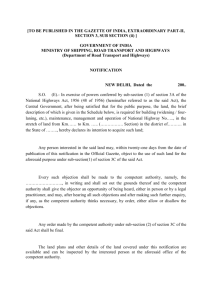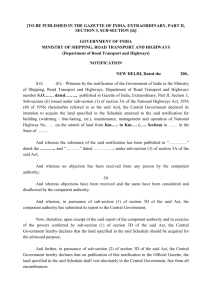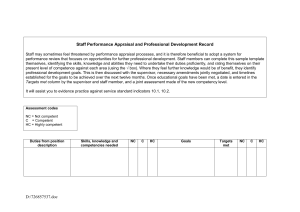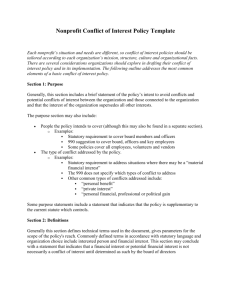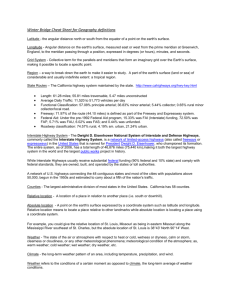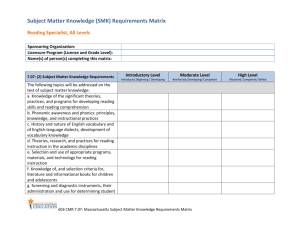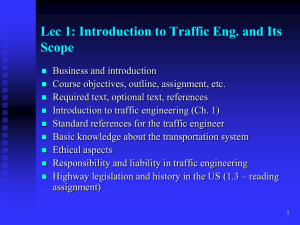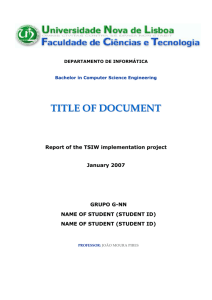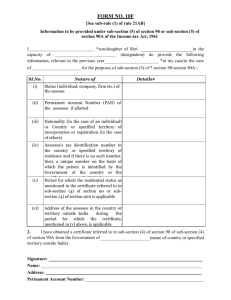THE NATIONAL .HIGHWAYS ACT, 1956
advertisement
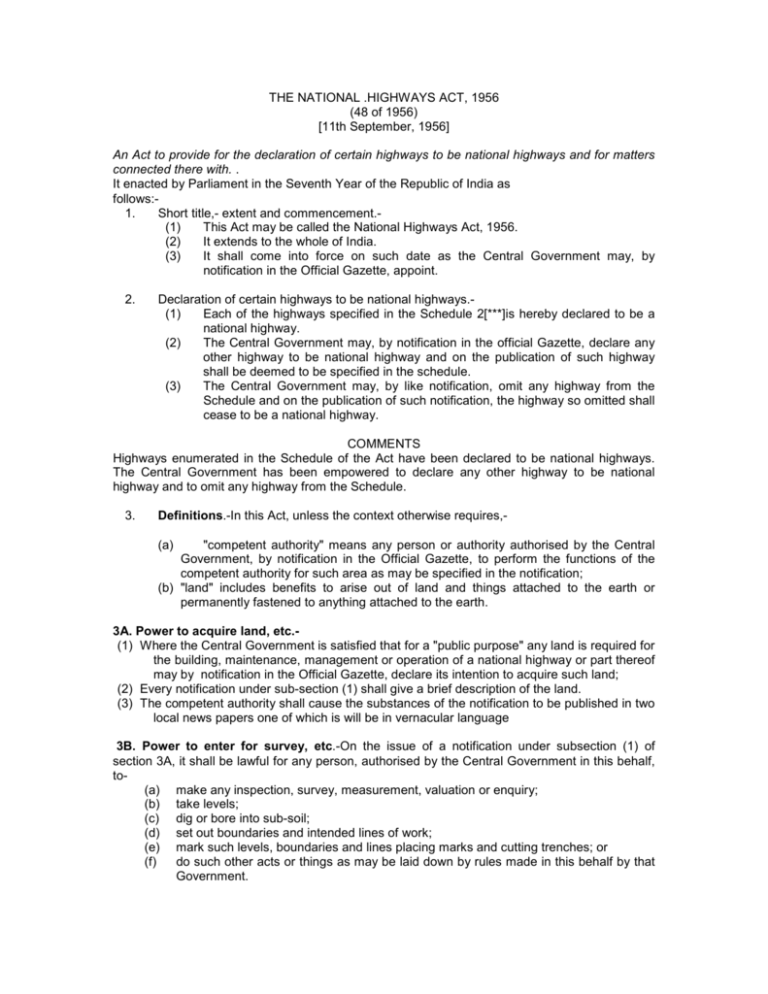
THE NATIONAL .HIGHWAYS ACT, 1956 (48 of 1956) [11th September, 1956] An Act to provide for the declaration of certain highways to be national highways and for matters connected there with. . It enacted by Parliament in the Seventh Year of the Republic of India as follows:1. Short title,- extent and commencement.(1) This Act may be called the National Highways Act, 1956. (2) It extends to the whole of India. (3) It shall come into force on such date as the Central Government may, by notification in the Official Gazette, appoint. 2. Declaration of certain highways to be national highways.(1) Each of the highways specified in the Schedule 2[***]is hereby declared to be a national highway. (2) The Central Government may, by notification in the official Gazette, declare any other highway to be national highway and on the publication of such highway shall be deemed to be specified in the schedule. (3) The Central Government may, by like notification, omit any highway from the Schedule and on the publication of such notification, the highway so omitted shall cease to be a national highway. COMMENTS Highways enumerated in the Schedule of the Act have been declared to be national highways. The Central Government has been empowered to declare any other highway to be national highway and to omit any highway from the Schedule. 3. Definitions.-In this Act, unless the context otherwise requires,(a) "competent authority" means any person or authority authorised by the Central Government, by notification in the Official Gazette, to perform the functions of the competent authority for such area as may be specified in the notification; (b) "land" includes benefits to arise out of land and things attached to the earth or permanently fastened to anything attached to the earth. 3A. Power to acquire land, etc.(1) Where the Central Government is satisfied that for a "public purpose" any land is required for the building, maintenance, management or operation of a national highway or part thereof may by notification in the Official Gazette, declare its intention to acquire such land; (2) Every notification under sub-section (1) shall give a brief description of the land. (3) The competent authority shall cause the substances of the notification to be published in two local news papers one of which is will be in vernacular language 3B. Power to enter for survey, etc.-On the issue of a notification under subsection (1) of section 3A, it shall be lawful for any person, authorised by the Central Government in this behalf, to(a) make any inspection, survey, measurement, valuation or enquiry; (b) take levels; (c) dig or bore into sub-soil; (d) set out boundaries and intended lines of work; (e) mark such levels, boundaries and lines placing marks and cutting trenches; or (f) do such other acts or things as may be laid down by rules made in this behalf by that Government. 3C Hearing of objections.(1) Any person interested in the land may, within twenty-one days from the date of publication of the notification under sub-section (1) of section 3A, object to the use of the land for the purpose or purposes mentioned in that sub-section. (2) Every objection under sub-section (1) shall be made to the competent authority in writing and shall set out the grounds thereof and the competent authority shall give the objector and may, after hearing all such objections and after making such further enquiry, if any, as the competent authority thinks necessary, by order, either allow or disallow the objections. (3) Any order made by the competent authority under sub-section (2) shall be final. 3D. Declaration of acquisition.(1) Where no objection under sub-section (1) of section 3C has been made to the competent authority within the period specified therein or where the competent authority has disallowed the objection under subsection of that section the competent authority shall, as soon as may be, submit a report accordingly to the Central Government and on receipt of such report, the Central Government shall declare, by notification in the Official Gazette, that the land should be acquired for the purpose or purposes mentioned in sub-section (1) of section 3A. (2) On the publication of the declaration under sub-section.(l),the land shall vest absolutely in the "'Central Government free from all encumbrances. (3) Where in respect of any land, a notification has been published under subsection (1) of section 3A for its acquisition but no declaration under sub-section(1)has been published within a period of one year from the date of publication of that notification, the said notification shall ceases to have any effect. Provided that in computing the said period of one year period or periods during which any action or proceeding to be taken in pursuance of the notification issued under sub section (1) of section 3 A is stayed by an order of court shall be excluded. (4) A declaration made by the Central Government under sub-section (1) shall not be called in question in any court or by any other authority. 3E. Power to take possession.(1) Where any land has vested in the Central Government under sub-section (2) of section 3D, and the amount determined by the competent authority under section 3G with respect to such land has been deposited under the sub-section (1) of section 3H, with the competent authority by the Central Government, the competent authority may by notice in writing direct the owner as well as any other person who may be in possession of such land to surrender or deliver possession thereof to the competent authority or any person duly authorised by it in this behalf within sixty days of the service of the notice. (2) If any person refuses or fails to comply with any direction made under subsection(1), the competent authority shall apply(a) in the case of any land situated in any area falling within the metropolitan area, to the Commissioner of Police; (b) in case of any land situated in any area other than the area referred to in clause (a), to the Collector of a District, and such Commissioner or Collector, as the case may be, shall enforce the surrender of the land, to the competent authority or to the person duly authorised by it. 3F. Right to enter into the land where land has vested in the Central Government:-Where the land has vested in the Central Government under section 3D, it shall be lawful for any person authorised by the Central Government in this behalf, to enter and do other act necessary upon the land for carrying out the building, maintenance, management or operation of a national highway or a part thereof, or any other work connected therewith. 3G. Determination of amount payable as compensation.(1) Where any land is acquired under this Act, there shall be paid an amount which shall be determined by an order of the competent authority. (2) Where the right of user or any right in the nature of an easement on, any land is acquired under this Act, there shall be paid an amount to the owner and any other person whose right of enjoyment in that land has been affected in any manner whatsoever by reason of such acquisition an amount calculated at ten per cent of the amount determined under sub section (1), for that land. (3) Before proceeding to determine the amount under sub-section (1) or subsection (2), the competent authority shall give a public notice published in two local newspapers, one of which will be in a vernacular language inviting claims from all persons interested in the land to be acquired. (4) Such notice shall state the particulars of the land and shall require all persons interested in such land to appear in person or by an agent or by a legal practitioner referred to in subsection (2) of section 3C, before the competent authority, at a time and place and to state the nature of their respective interest in such land. (5) If the amount determined by the competent authority under sub-section (1) or sub-section (2) is not acceptable to either of the parties, the amount shall, on an application by either of the parties, be determined by the arbitrator to be appointed by the Central Government. (6) Subject to the provisions of this Act, the provisions of the Arbitration and Conciliation Act, 1996 (26 of 1996) shall apply to every arbitration under this Act. (7) The competent authority or the arbitrator while determining the amount under sub-section (1) or sub-section (5), as the case may be, shall take into consideration(a) the market value of the land on the date of publication of the notification under section 3A; (b) the damage, if any, sustained by the person interested at the time of taking possession of the land, by reason of the severing of such land from other land; (c) the damage, if any, sustained by the person interested at the time of taking possession of the land, by reason of the acquisition injuriously affecting his other immovable property in any manner, or his earnings; (d) if, in consequences of the acquisitionof theland, the person interested is compelled to change his residence or place of business, the reasonable expenses, if any, incidental to such change. 3H. Deposit and payment of amount.(1) The amount determined under section 3G shall be deposited by the Central Government in such manner as may be laid down by rules made in this behalf by that Government, with the competent authority before taking possession of the land. (2) As soon as may be after the amount has been deposited under sub-section (I), the competent authority shall on behalf of the Central Government pay the amount to the person or persons entitled there to. (3) Where several persons claim to be interested in the amount deposited under sub-section (1), the competent authority shall determine the persons who in its opinion are entitled to receive the amount payable to each of them. (4) If any dispute arises as to the apportionment of the amount or any part thereof or to any person to whom the same or any part thereof is payable, the competent authority shall refer the dispute to the decision of the principal civil court of original jurisdiction within the limits of whose jurisdiction the land is situated. (5) Where the amount determined under section 3G by the arbitrator is in excess of the amount determined by the competent authority, the arbitrator may award interest at nine per cent per annum on such excess amount from the date of taking possession under section 3D till the date of the actual deposit thereof. (6) Where the amount determined by the arbitrator is in excess of the amount determined by the competent authority, the excess amount together with interest, if any, awarded under sub-section (5) shall be deposited by the Central Government in such manner as may be laid down by rules made in this behalf by that Government, with the competent authority and the provisions of sub-sections (2) to (4) shall apply to such deposit. 3-I. Competent authority to have certain powers of civil court.-The competent authority shall have, for the purposes of this Act. all the powers of a civil court while trying d suit under the Code of Civil Procedure, 1908 (5 of 1908), in respect of the following matters, namely:(a) summoning and enforcing the attendance of any person and examining him on oath (b) requiring the discovery and production of any document; (c) reception of evidence on affidavits; (d) requisitioning any public record from any court or office; (e) issuing commission for examination of witnesses. 3J Land Acquisition Act1of1894, not to apply:-nothing in the Land Acquisition Act; 1894 shal1 apply to an acquisition Act 1984 shall apply to an acquisition under this act. COMMENTS If any land is acquired under the provisions of this Act then nothing in the Land Acquisition Act, 1894 (1 of 1894) shall apply. 4. National highways to vest in the Union.-All national highways shall vest in the Union, and for the purposes of this Act "highways" include(i.) all lands appurtenant thereto, whether demarcated or not; (ii.) all bridges, culverts, tunnels, causeways, carriageways and other structures constructed on or across such highways; and (iii.) all fences, trees, posts and boundary, furlong and milestones of such highways or any land appurtenant to such highways. 5. Responsibility for development and maintenance of national highways.-It shall be the responsibility of the Central Government to develop and maintain in proper repair all national highways; but the Central Government may, by notification in the Official Gazette, direct that any function in relation to the development or maintenance of any national highway shall, subject to such conditions, if any, as may be specified in the notification, also be exercisable by the Government of the State within which the national highway is situated or by any officer or authority subordinate to the Central Government or to the State Government. COMMENTS The Central Government is responsible for the development and maintenance of all the national highways but by notification in the Official Gazette it may direct that any function regarding development and maintenance of any national highway shall also be exercisable by the Government of the State within which the national highway is situated. 6. Power to issue directions.-The Central Government may give directions to the Government of any State as to the carrying out in the State of any of the provisions of this Act or of, any rule, notification or order made there-under. Fees for services or benefits rendered on national highways.- 7. (1) The Central Government may, by notification in the Official Gazette, levy fees at such rates as may be laid down by rules made in this behalf for services or benefits rendered in relation to the use of ferries, [permanent bridges the cost of construction of each of which is more than rupees twenty-five lakhs and which are opened to traffic on or after the 1st day of April, 1976,] temporary bridges and tunnel on national highways [and the use of sections of national highways]. (2) Such fees when so levied shall be collected in accordance with the rules made under this Act. - (3) Any fee leviable immediately before the commencement of this Act for services or benefits rendered in relation to the use of ferries, temporary bridges and tunnels on any highway specified in the Schedule shall continue to be leviable under this Act unless and until it is altered in exercise of the powers conferred by sub-section (1): [Provided that if the Central Government is of opinion that it is necessary in the public interest so to do, it may, by like notification, specify any bridge in relation to the use of which fees shall not be leviable under this sub-section.] COMMENTS The Central Government is empowered to levy fees for services or benefits rendered in relation to the use of ferries, temporary bridges and tunnels on national highways and the use of sections of national highways. 8. **** 8A. Power .of Central Government to enter into agreements for development and maintenance of national highways.(1) Notwithstanding anything contained in this Act, the Central Government may enter into an agreement with any person in relation to the development and maintenance of the whole or any part of a national highway. (2) Notwithstanding anything contained in section 7, the person referred to in sub-section (1) is entitled to collect and retain fees at such rate, for services or benefits rendered by him as the Central Government may, by notification in the Official Gazette, specify having regard to the expenditure involved in building, maintenance, management and operation of the whole or part of such national highway, interest on the capital invested, reasonable return, the volume of traffic and the period of such agreement. (3) A person referred to in sub-section (1) shall have powers to regulate and control the traffic in accordance with the provisions contained in Chapter VIII of the Motor Vehicles Act, 1988 (59 of 1988) on the national highway forming subject matter of such agreement, for proper management thereof. 8B. Punishment for mischief by injury to national highway.-Whoever commits mischief by doing any act which renders or which he knows to be likely to render any national highway referred to in sub-section (1) of section 8A impassable or less safe for travelling or conveying property, shall be punished with imprisonment of either description for a term which may extend to five years, or with a fine, or with both.] 9. Power to make rules,(1) The Central Government may, by notification in the Official Gazette, make rules for carrying out the purposes of this Act. (2) In particular and without prejudice to the generality of the foregoing power, such rules may provide for all or any of the following matters, namely:(a) the manner in which, and the conditions subject to which, any function in relation to the development or maintenance of a national highway or any part thereof may be exercised by the State Government or any officer or authority subordinate to the Central Government or the State Government; (aa) the manner in which the amount shall be deposited with the competent authority under sub-sections (1) and (6) of section 3H;] (b) the rates at which fees for services rendered in relation to the use of ferries, permanent bridges, temporary bridges and tunnels on any national highway and the use of sections of any national highway may be levied, and the manner in which such fees shall be collected, under section 7; (c) the periodical inspection of national highways and the submission of inspection reports to the Central Government; (d) the reports on works carried out on national highways; (e) any other matter for which provision should be made under this Act. (3) 10. Every rule made under this section shall be laid, as soon as may be after it is made, before each House of Parliament, while it is in session, for a total period of thirty days which may be comprised in one session or in two or more successive sessions and if, before the expiry of the session immediately following the session or the successive sessions aforesaid, both Houses agree in making any modification in the rule or both Houses agree that the rule should not be made, the rule shall thereafter have effect only in such modified form or be of no effect, as the case may be; so, however, that any such modification or annulment shall be without prejudice to the validity of anything previously done under that rule. Laying of notifications, rules, etc., before Parliament.—All notifications or agreements issued or entered into under this Act shall be laid before both Houses of Parliament as soon as may be after they are issued or entered into 5[***].
